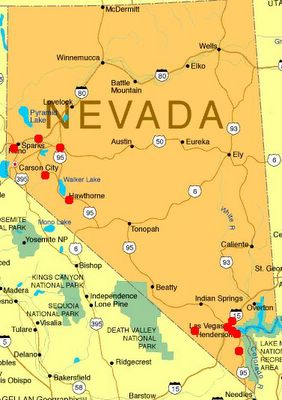For Nevada Voters: State Question 1
By request, I'm doing a series of posts on the ballot initiatives for the November 7 elections here in Nevada. If you don't live in Nevada, you probably won't find this the least bit interesting, and I recommend you go do something more intellectually stimulating.
Question 1:
Shall the Nevada Constitution be amended to require the Nevada Legislature to fund the operation of the public schools for kindergarten through grade 12 before funding any other part of the state budget for the next biennium?
I've tentatively decided "NO." And not just because of my intense hatred for children.
This initiative is a reaction to the legislative gridlock in 2003 that produced one of the worst judicial decisions I've ever read, Guinn v. Legislature. For those of you who weren't around at the time, here's the story: The Nevada Constitution requires that the legislature fund the public schools. Nevadans also recently passed a ballot initiative that forbids tax increases without a super-majority -- over 66% of the legislature has to approve the tax hike. In 2003, the budget was all prepared except for the education portion. The liberals decided that they wanted to increase taxes to pay for their pet projects. A handful of conservatives resisted, insisting that if there was not enough left in the budget for education, they should re-open the finished portions of the budget rather than raising taxes. The liberals were in the majority, but not in the super-majority, so they were at a deadlock.
When the legislative session expired, they still had no education budget. Governor Guinn was forced to call a special session to give the legislators more time to break the deadlock. That special session expired, again with no budget. Guinn called another special session, and again, no budget. So he did what any responsible, conservative Republican would do: he sued the entire legislature.
The Supreme Court wrote an absolutely terrible decision. They invented a distinction between constitutional clauses that are "substantive" (e.g. funding schools) and those that are merely "procedural" (e.g. a popularly-enacted super-majority requirement for tax increases). They said that where two clauses cannot be reconciled, the substantive clauses may "temporarily" cancel out the procedural clauses. They ruled that the legislature could raise taxes with only 50% approval, which gave Nevadans the biggest tax hike in history. Thanks, Supreme Court!
Of course the distinction is moot: even if you agree that the two clauses really could not be reconciled, it is critical to note that one of the two is an amendment. When the Constitution is amended, that means certain parts of it might not apply anymore. In the U.S. Constitution, the runaway slave clause is clearly inconsistent with the equal protection clause -- but there's no need to find some fancy way of reconciling them. One of them is an amendment, which means the other one is simply void, to the extent inconsistent with the amendment. That's what amendments do. You'd think our state Supreme Court would be aware of that definition.
Anyway, Question 1 is an attempt to prevent another Guinn scenario. It's not completely unreasonable: after all, although the Supremes said the super-majority requirement was only "temporarily" suspended, the Court announced a rule that it could be suspended whenever a governor wants to illegally pressure the legislature. The precedent has been set.
My first problem is that Question 1 looks like needless micro-management. I'm not suggesting that the people have no right to dictate procedure, just that it's not necessarily a good idea. The second problem is that Guinn has already been reversed, to the extent it made the procedure/substance requirement. That's probably in part a reaction to the fact that Guinn caused such a firestorm. So much so, in fact, that Judge Nancy Becker, who is up for re-election this term and who joined the majority in Guinn, will probably lose her job. (She trails Nancy Saitta in the most recent poll I've seen). The third problem is that this kind of micromanagement can't prevent legislative obstructionism -- only shame can do that, and Nancy Becker's impending demotion suggests Nevadans know how to do that. The solution is bad press, not tinkering with the constitution. Fourth, sad experience shows that our supreme court will do anything in its power to allow the legislature to raise taxes whenever it wants, and the will of the people has very little influence on that.







